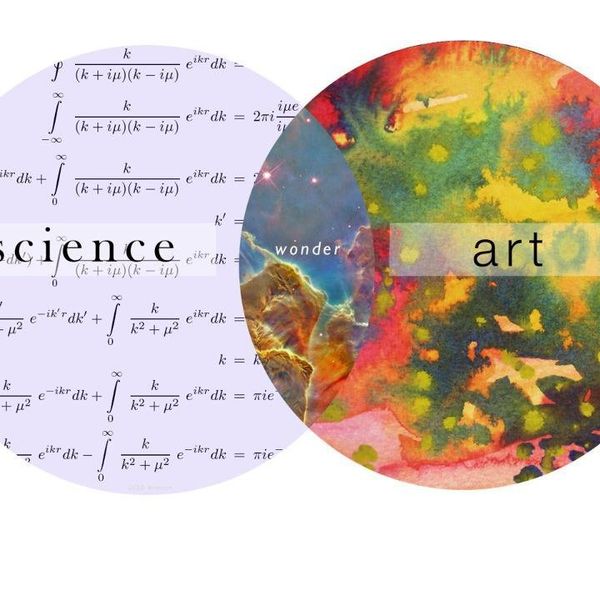Some of the responses you get when you say you're majoring in Liberal Arts:
"There's no money in that field."
"You're wasting your time."
"You'll never find a job."
"Study something that challenges you."
"The Arts are dying."
"Liberal Arts majors are useless once you graduate."
"Oh, so that's why you have such a high GPA, your classes are so easy."
First of all, I want to say "thank you" to all the people who have said these things. You'd think I would be mad, insulted even, and at first, I was. But now, I'm not mad or insulted in the slightest. I'm motivated. The unwanted, unwelcomed statements you made were helpful. Your advice made me consider whether or not a degree in Liberal Arts was worth it. You made me second guess myself. You pushed me to do the research so I knew what I was getting into. Your words have made me realize that yes, after all of your negativity, after all of your snide remarks, a degree in Liberal Arts is still worth it. Thank you.
In third grade, the formulas and symbols in my math and science classes began to frustrate and confuse me. As the years went on, I never really tried to understand these subjects on a deeper level because they didn't come easily to me and frankly, I just wasn't interested. I knew I liked to write and I knew I liked to sing. I did my first musical in the third grade, "The Mice from Outer Space," and I was hooked. Writing, music, acting and interacting with people came easily to me and caught my interest. Whenever I did these things, I felt energized and excited. I felt confident. And, as an elementary schooler, this made me feel like there was something wrong with me. The "important subjects," math and science, didn't make me feel this way, they were hard. Aren't the important things supposed to be hard? With that question in the back of my head, I continued to excel in writing and the arts, but my weakness in math and science always haunted me. Finally, during my junior year of high school, when I began to think about what field I wanted to study in college, I realized that STEM (Science, Technology, Engineering and Math) majors weren't the end all be all, contrary to popular opinion.
I was scared. I had wanted to be a nurse since I was little, but the closer I got to college, the less appealing that career path seemed to me, considering that I would have to take several advanced math and science classes. It wasn't that I couldn't put in the work that was needed to excel in these classes, it was that I didn't want to. And as it turns out, I finally figured out that I didn't have to. After years of struggling with math and science and feeling like I wasn't going anywhere without mastering them, I took a step back and asked myself what I really liked to do. I love people, I love to write and I love the arts.
And if you're like me, you know the answer was easy--a major in Liberal Arts. But the hardest part? Accepting this in spite of all the negativity and the pressures of the STEM-centered society we live in today.
Here's what helped me:
1. Right Brain vs. Left Brain
Have you ever heard someone say that they're a "right brain" or "left brain" thinker? I have. Each hemisphere of the brain processes information differently. Most people have a natural propensity toward one hemisphere, although both constantly work together to process information effectively. The right brain is associated with creativity and visual information. The left brain is associated more with logic and analytics. Right-brained thinkers tend to be more creative and free spirited, and thus are likely inclined to enjoy the arts. Left brained thinkers are more likely to be good at math and enjoy clear-cut, linear answers and outcomes. Which side we have the natural tendency toward isn't our choice, it's a part of how our brain is wired, it won't change, so you have to embrace it.
2. Strengths and Weaknesses
Some say that anyone can major in a Liberal Art, that Liberal Arts are what people who can't do anything else major in, that the classes we have to take are "so easy." And sure, I guess certain aspects may be a piece of cake to some, but to others, no way. If I ask someone who has never done theater in their life to get up on a stage and perform in front of 1,000 people, do you think they could do it? Sure it's possible, but would they want to? Probably not, it might be a little daunting. Or say I take a theater major, who only took Chemistry in high school, and enroll them in an Organic Chemistry class. Do you think they would do well? Sure, it's possible, but don't you think they would rather be onstage than figuring out (this scares me already) how many stereoisomers of (CH3)2CHCH=CHCH2CH(OH)CH2Br are possible? Absolutely. Just because these people have different strengths and weaknesses doesn't make one smarter than the other.
3. The Definition of Success Varies
What is success? Everyone has a different definition. Is it making a lot of money? Is it finding true love? Is it making a difference in the world? There really is no way to sum it all up, and there has never been, nor will there ever be, a “most successful” person in the world. When many people think success, they think Bill Gates. When I think success, I think Mother Teresa. While some may measure success by the amount of money one gains, others measure success by the number of lives one has touched. Sure, Bill Gates makes a lot of money, but has he touched people’s lives on a personal level the way Mother Teresa did? Sure, she has made a huge difference in how the less fortunate are treated, but did she make as much money as Bill Gates? What many people do not know is that there is more than one interpretation of what it means to be rich. Bill Gates is rich in a monetary sense, while Mother Teresa was rich in a charitable sense. There is no way to determine which rendition of the term “rich” makes a person more successful. Neither individual is more successful than the other, it is all a matter of what one considers to be success.
4. The World Needs More People People
One of the most beautiful things that I've found within the community of Liberal Arts majors is the overwhelming acceptance of others as opposed to just tolerance. The community is such a welcoming place because the field focuses a large amount on social sciences and humanities. That being said, because we study such a wide array of subjects, we soon find out that there are various kinds of people in the world. Once we figure out that nobody is the same, acceptance ensues. Understanding one another is key. With knowledge comes responsibility, and we have a job to do. We are a team of entertainers, educators and creators. Inform, inform, inform. With all the bad things that have been occurring recently, this is more important than ever.
5. Don't Do It for the Money, Do It Because You Love it
Plain and simple, do something you love, something that makes you want to go to work every day. The most frequent "piece of advice" I've gotten is that there is no money in Liberal Arts, that all the money is in STEM. While I believe this to be a huge over exaggeration, I will admit, there is an increased demand for STEM-educated workers today, and yes they do get a bit more money. Liberal Arts careers do offer a good amount of money as well, one can make a good living, but is money really so important that you should risk a happy career for it? If so, we need to take a step back and think about how we are letting money control us, but that's a whole other issue. Yes, money does have importance, but wouldn't you rather be broke and happy than rich and miserable? Do what you love while you still have the time.
Now, I'm not going to sit here and say that Liberal Arts majors are more important than STEM majors because they're not. Their importance can't be compared to one another. These are two completely different fields with completely different skill sets, all of which have their own importance. All I know is that numbers aren't my thing. They have never been and never will be. I've accepted it. However, I have tons of friends who are STEM majors and numbers ARE their thing. It amazes me how their brains work and I would love to step into one of their heads for a day to see how they think. To all the STEM majors, I think you guys are truly amazing. I don't think you should be looked down on if you get stage fright or can't write a 2000-word paper in a few hours, and I don't think I should be looked down on if I can't calculate how many stereoisomers of (CH3)2CHCH=CHCH2CH(OH)CH2Br are possible.
I want to give a huge thank you to all of the people who have stood by me when others doubted me, especially when I doubted myself. Thanks for backing me up and supporting me in all my choices because you love me and want me to be the best and happiest. To my STEM friends, thanks for spending countless hours trying to help me with my homework to no avail. I'm sorry if I frustrated you. I frustrated me too. No matter how long we worked or how hard we tried, I still wouldn't have gotten it. That's on me.
And to the people who still won't give Liberal Arts majors a chance, my heart hurts for you, but I wish you the best of luck and a lifetime of happiness wherever your career may take you, I truly do. In the end, what I do with my career doesn't concern you. You can go right ahead and watch me waste my time. Watch me miss out on all that money I could have gotten had I chosen another major. But don't think for a second that you'll see me live an unfulfilled, unhappy life because that sure as hell isn't going to happen.





















